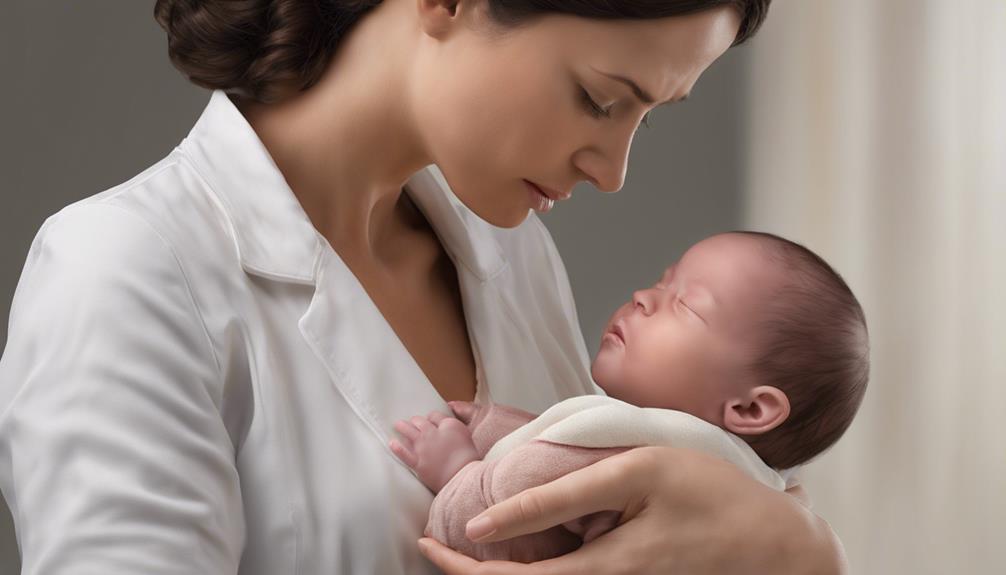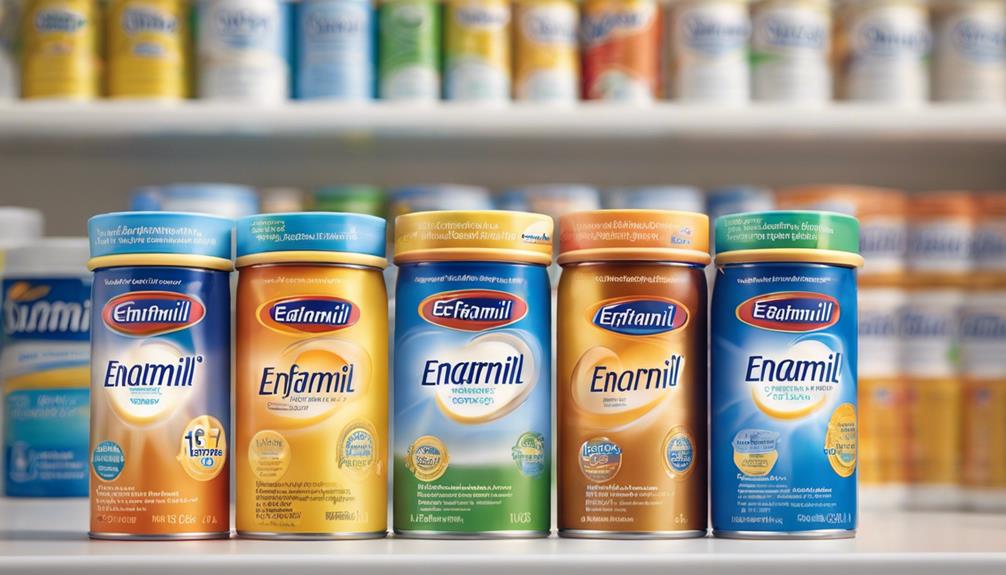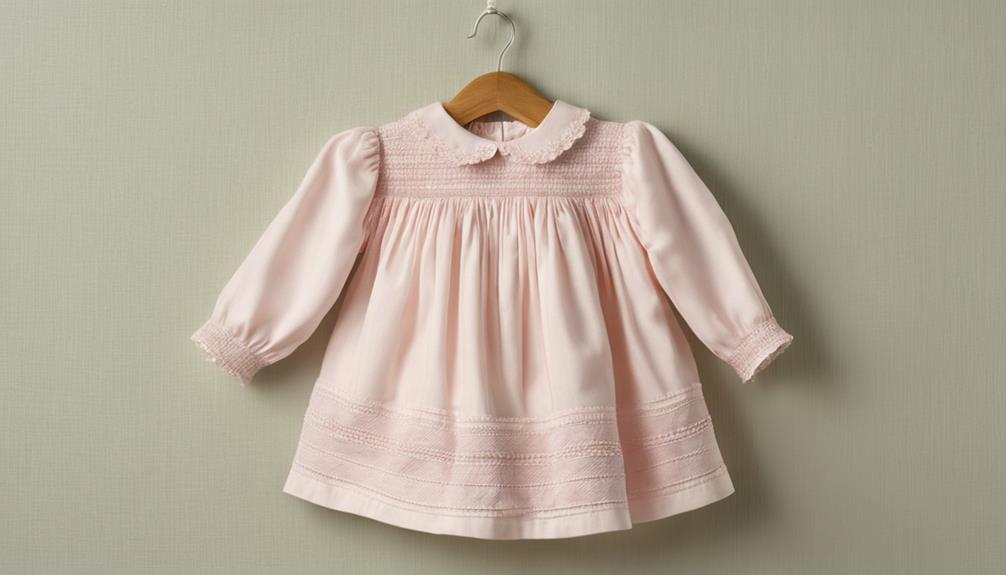When it comes to caring for newborns, managing hiccups can be unfamiliar territory. However, don’t worry, this guide will help navigate you through.
With each hiccup interrupting your baby's peace, you might be left wondering how to steer towards relief. The steps outlined ahead will equip you with the tools needed to sail these choppy waters and guarantee calm for your little one.
Ready to set sail on this journey towards hiccup-free tranquility?
Key Takeaways
- Burping and proper feeding techniques help alleviate newborn hiccups.
- Positioning techniques like holding upright can aid in relieving hiccups.
- Seek medical advice if hiccups persist or are accompanied by concerning symptoms.
- Avoid gripe water and create a calm feeding environment for hiccup prevention.
Causes of Newborn Hiccups
If your newborn is experiencing hiccups, understanding the various causes can help you address and alleviate this common occurrence. Newborn hiccups are often triggered by factors like eating too quickly, excess air during feeding, or the Tonic Neck Reflex. These involuntary contractions of the diaphragm muscle can also be linked to acid reflux or an immature digestive system in babies. The sensitivity of a newborn's system means that sudden temperature changes can also lead to hiccups.
It's important to pay attention to your baby's feeding habits and environment to identify potential triggers for hiccups. Ensuring a calm and relaxed feeding environment, burping your baby frequently during feedings, and keeping your baby upright after meals can help reduce the occurrence of hiccups. If you suspect that acid reflux may be the cause, consulting with your pediatrician for guidance on managing your baby's symptoms is advisable. By recognizing the various causes of newborn hiccups, you can effectively address and minimize this common issue for your little one.
Simple Remedies for Newborn Hiccups

To help alleviate your newborn's hiccups, consider gently patting or rubbing their back to encourage burping and release excess gas. Offering a pacifier can also help relax the diaphragm and aid in stopping the hiccups. Remember, hiccups are common in newborns and usually stop naturally within 5 to 10 minutes. Avoid using gripe water for hiccups without clinical evidence supporting its effectiveness. Creating a calm environment during feeding can help prevent and manage newborn hiccups effectively.
| Remedies | Description |
|---|---|
| Burping | Gently pat or rub your newborn's back to release excess air causing hiccups |
| Pacifier | Offer a pacifier to help relax the diaphragm and potentially stop hiccups |
| Allow to Stop | Let hiccups stop naturally within 5 to 10 minutes, as they commonly do |
| Avoid Gripe Water | Refrain from using gripe water without clinical evidence for its efficacy |
Positioning Techniques for Hiccup Relief

When your newborn experiences hiccups, consider implementing positioning techniques to help alleviate their discomfort and promote relief. Holding your baby upright after feeding is a simple yet effective way to relieve hiccups. This position allows trapped air to escape more easily, reducing the duration of hiccups. Additionally, placing your baby in a slightly inclined position during and after feeding can prevent stomach contents from regurgitating and triggering hiccups. Supporting your baby's head and neck while keeping them upright aids in digestion and decreases the likelihood of hiccups occurring.
For further relief, gently pat or rub your baby's back while holding them upright to assist in burping and alleviate hiccups. If your baby enjoys movement, using a baby carrier or baby swing in an upright position after feeding can also help prevent hiccups. The gentle movement promotes digestion and may reduce the occurrence of hiccups. Experiment with these positioning techniques to find what works best for your little one's hiccups.
Preventing Hiccups in Newborns

Help your newborn avoid hiccups by adopting feeding practices that promote a calm and moderate pace. Proper positioning during feedings is vital as it helps minimize air intake, reducing the likelihood of hiccups. Remember to burp your baby frequently during and after feedings to prevent excess air in the stomach, a common cause of hiccups. Offering smaller, more frequent feedings can also help by reducing the amount of air swallowed. Creating a calm environment during feeding time is essential as it reduces stress and anxiety, which can contribute to hiccups in newborns.
| Feeding Practice | Description | Benefits |
|---|---|---|
| Moderate Feeding Pace | Feed your baby slowly and calmly | Prevents hiccups caused by eating too quickly |
| Proper Positioning | Ensure your baby is in a comfortable feeding position | Minimizes air intake, reducing hiccups |
| Frequent Burping | Burp your baby during and after feedings | Prevents excess air in the stomach, reducing hiccups |
| Small, Frequent Meals | Offer smaller feedings more frequently | Reduces air swallowed, decreasing hiccups |
When to Seek Medical Advice

If your baby's hiccups persist for over an hour despite trying remedies, it's important to seek medical advice promptly. Here are some indicators that suggest it's time to consult a healthcare provider regarding your newborn's hiccups:
- Consult a healthcare provider if your baby's hiccups are accompanied by symptoms like vomiting, fever, or breathing difficulties.
- Persistent hiccups in newborns may indicate an underlying issue that requires professional evaluation.
- If your baby shows signs of discomfort or distress during hiccups, it's advisable to seek medical attention promptly.
- Babies with gastroesophageal reflux disease (GERD) may experience severe hiccups, necessitating immediate medical help.
- When in doubt about your infant's health, don't hesitate to reach out to a medical professional for guidance.
Frequently Asked Questions
How Do You Get Rid of Hiccups for Newborns Fast?
To help your newborn get rid of hiccups fast, try burping them, offering a pacifier, changing their position, or gently rubbing their back. These simple techniques can quickly ease hiccups without any risky adult remedies.
What Is the Best Position for Baby Hiccups?
When your baby hiccups, holding them upright against your chest, supporting their head and neck while sitting, or gently patting their back can help. These positions can ease hiccups and bring comfort to your little one.
Is It OK to Lay Baby Down With Hiccups?
It's totally fine to lay your baby down with hiccups. Hiccups are common and harmless. Your baby can sleep comfortably; they usually go away on their own. No need to worry; it won't harm them.
How to Get Rid of Hiccups Fast?
To get rid of hiccups fast, try burping or offering a pacifier to relax the diaphragm. Gently rubbing their back while holding upright or changing feeding position can help. Let hiccups resolve naturally in 5-10 minutes.
Conclusion
To wrap up, managing newborn hiccups can be done effectively with simple remedies and positioning techniques. Remember, seeking medical advice is important if hiccups persist or are accompanied by other symptoms.
Did you know that up to 96% of newborns experience hiccups, making it a common occurrence that can be easily managed with the right approach?
Stay informed, stay proactive, and guarantee your baby's comfort and well-being.








